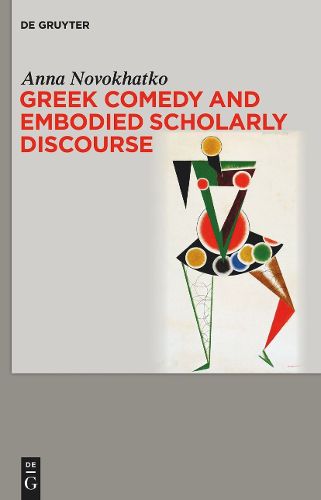Readings Newsletter
Become a Readings Member to make your shopping experience even easier.
Sign in or sign up for free!
You’re not far away from qualifying for FREE standard shipping within Australia
You’ve qualified for FREE standard shipping within Australia
The cart is loading…






Comedy created a joyful mode of perceiving rhetoric, grammar, and literary criticism through the somatic senses of the author, the characters, the actors and the spectators. This was due to generic peculiarities including the omnivore mirroring of contemporary (scholarly) ideas, the materiality of costumes and masks, and the embodiment of abstract notions on stage, in short due to the correspondence between body, language and environment. The materiality of words, letters and syllables in ancient grammar and stylistic criticism is related to the embodied criticism found in Greek comedy. How are scholarly discourses embodied? The act of writing is vividly enacted on stage through carving with effort the shape of the letter 'rho' and commenting emotionally on it. The letters of the alphabet are danced by the chorus, the cognitive and communicative power of gestures and body expression providing emotional context. A barking pickle brine from Thasos is perhaps an olfactory somatosensory visual and auditory embodiment of Archilochean poetry, whilst the actor's foot in dance is a visual and motor embodiment of a metrical foot on stage. Comedy with its actors, costumes, masks, and props is overflowing with such examples. In this book, the author suggests that comedy made a significant contribution to the establishment of scholarly discourses in Classical Greece.
$9.00 standard shipping within Australia
FREE standard shipping within Australia for orders over $100.00
Express & International shipping calculated at checkout
Comedy created a joyful mode of perceiving rhetoric, grammar, and literary criticism through the somatic senses of the author, the characters, the actors and the spectators. This was due to generic peculiarities including the omnivore mirroring of contemporary (scholarly) ideas, the materiality of costumes and masks, and the embodiment of abstract notions on stage, in short due to the correspondence between body, language and environment. The materiality of words, letters and syllables in ancient grammar and stylistic criticism is related to the embodied criticism found in Greek comedy. How are scholarly discourses embodied? The act of writing is vividly enacted on stage through carving with effort the shape of the letter 'rho' and commenting emotionally on it. The letters of the alphabet are danced by the chorus, the cognitive and communicative power of gestures and body expression providing emotional context. A barking pickle brine from Thasos is perhaps an olfactory somatosensory visual and auditory embodiment of Archilochean poetry, whilst the actor's foot in dance is a visual and motor embodiment of a metrical foot on stage. Comedy with its actors, costumes, masks, and props is overflowing with such examples. In this book, the author suggests that comedy made a significant contribution to the establishment of scholarly discourses in Classical Greece.